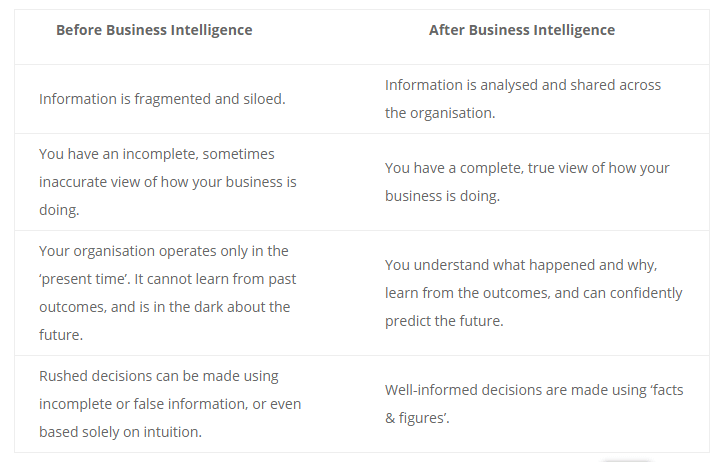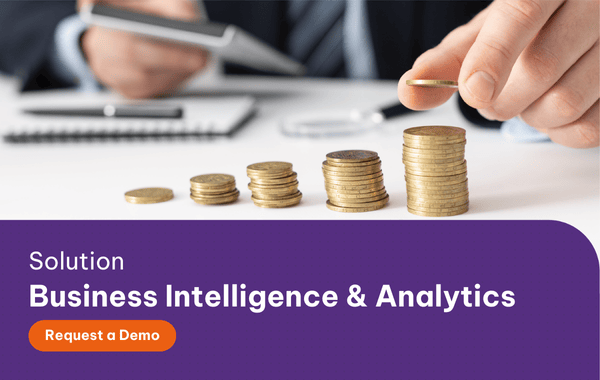Today, Business Intelligence or Business Analytics sounds like a novel concept born in the Digital Age. But the first Business Intelligence-like application was actually created more than 65 years ago in a British tea shop.
The year is 1951 and J. Lyons and Co., a UK catering and food manufacturing company, successfully tested the world’ first business computer. Dubbed LEO (Lyons Electronic Office), this machine occupied 460 square metres and was powered by 6,000 vacuum tubes with a clock speed of just 500 kHz1,3.

One of LEO’s first applications was to calculate the “overnight production requirements”2 based on the orders taken earlier on that day. In other words, it turned data into actionable information, which is the very essence of Business Intelligence.
In a 1957 promotional film, LEO was described to have the role of providing “statistics from a mass of data so that management can grasp the changing factors and act accordingly.”
Read more: 3 best Business Intelligence & Analytics vendors 2017
LEO’s performance was like from the Stone Age by today’s standards. Still, the application was no less revolutionary compared to modern BI software. It provided Lyon’s managers with forward-looking information – how many cakes to be made – on a near real-time basis – within the same day. It also facilitated the flow of information among departments – call centre and production.
Of course, the term “Business Intelligence” itself did not exist at that time. It was coined by the consulting firm Gartner in 1989 and has been popularised since then. But as the Lyon’s case has shown, that does not mean BI-like applications had not been used long before that.

From DSS to Business Intelligence
The umbrella term that includes Business Intelligence and was popular during the period from the mid-70s to 90s is Decision Support Systems (DSS). A DSS is any computerised information system that assists organisational decision-making process.
Interestingly, this term is much more straightforward and easy-to-understand than the more contemporary term of Business Intelligence.
According to Professor Daniel J. Power4, there are 5 categories of DSS:
- Model-driven DSS emphasize manipulation of “financial, optimization and/or simulation models.” It could be as simple as an optimisation solver add-in for Microsoft Excel.
- Data-driven DSS emphasize manipulation of time-series or real-time internal and external data of an organisation. Data warehouse with OLAP (On-line Analytical Processing) tool is a typical example of a Data-driven DSS.
- Communication-driven DSS such as computer-based bulletin boards and video conferencing tools facilitate organisation-wide “decision-relevant collaboration and communication.”
- Document-driven DSS manage document databases, retrieval, and analysis.
- Knowledge-driven DSS such as A.I. and expert systems provide specialised problem-solving expertise.
Business Intelligence solutions are essentially data-driven DSS used for business purposes. They all aim at improving “business decision making by using fact-based support systems.”
Infographic: 4 Steps to Automate Enterprise Data Management
Additionally, many modern BI solutions can also be considered communication-driven DSS because they come equipped with tools to facilitate collaboration such as web-based interactive dashboards.
So what exactly is Business Intelligence and how does it benefit organisations?
What is Business Intelligence?
In today’s digitalised world, every business creates and consumes data. In many cases, however, data is an underutilised asset because of its sheer volume and complexity.
Business Intelligence solutions help you make sense of your data and turn it into actionable insights, which drastically change how your organisation operates and makes decisions.

Subscribe to our Blog to stay informed with the latest Business Intelligence knowledge.
Sources:
1. www.telegraph.co.uk/technology/news/8879727/How-a-chain-of-tea-shops-kickstarted-the-computer-age.html
2. en.wikipedia.org/wiki/LEO_(computer)
3. www.zdnet.com/article/inside-leo-the-first-business-computer/
4. dssresources.com/history/dsshistory.html
Relate video: A 1957 promotional film of LEOs
 English
English  Vietnamese
Vietnamese 



